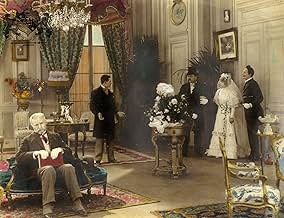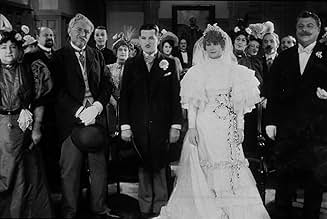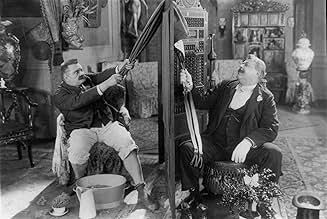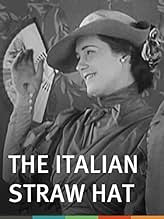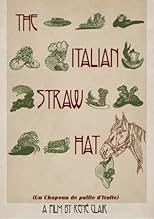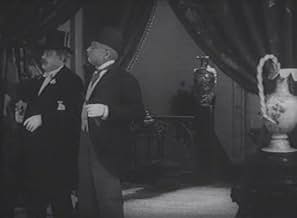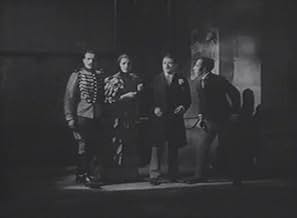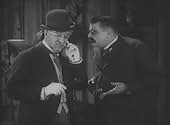Agrega una trama en tu idiomaOn his way through the woods to his marriage, Fadinard's horse eats the hat of a married lady spending here a few moments with her lover. Fadinard has to find the very same rare hat to avoid... Leer todoOn his way through the woods to his marriage, Fadinard's horse eats the hat of a married lady spending here a few moments with her lover. Fadinard has to find the very same rare hat to avoid her dishonor. This will greatly disturb his own marriage.On his way through the woods to his marriage, Fadinard's horse eats the hat of a married lady spending here a few moments with her lover. Fadinard has to find the very same rare hat to avoid her dishonor. This will greatly disturb his own marriage.
- Dirección
- Guionistas
- Elenco
Alice Tissot
- Une cousine
- (as Mme Alice Tissot)
Alexej Bondireff
- Un cousin
- (as M. Alexis Bondi)
Marise Maia
- La mariée
- (as Mlle Maryse Maia)
Yvonneck
- Nonancourt
- (as M. Yvonneck)
Louis Pré Fils
- Cousin Bobin
- (as M. Pré fils)
Albert Préjean
- Fadinard, le marié
- (as M. Albert Préjean)
Geymond Vital
- Le lieutenant Tavernier
- (as M. Vital Geymond)
Olga Tschechowa
- Anaïs de Beauperthuis
- (as Mme Olga Tschekova)
Paul Ollivier
- L'oncle Vézinet
- (as M. Paul Olivier)
Alex Allin
- Félix
- (as M. Alex Allin)
André Volbert
- Le maire
- (as M. Volbert)
Jim Gérald
- Beauperthuis
- (as M. Jim Gérald)
Lya Christy
- Une invitée de la noce
- (as Christie)
Nino Constantini
- Un invité de la noce
- (as Nino Costantini)
A. Debriège
- Une invitée de la noce
- (as Albany Debriège)
- Director
- Guionistas
- Todo el elenco y el equipo
- Producción, taquilla y más en IMDbPro
Opiniones destacadas
I just looked at Rene Clair's "An Italian Straw Hat" for the second time -- the first time in a dozen years and though I am now aware of potential issues with the viewing process -- like most late silent pictures, it almost certainly plays better with an audience -- seeing it by myself on my TV, it again falls a bit flat. The last time it was on a mediocre VHS copy. This time it was on the beautifully transferred Flicker Alley DVD.
This weakness surprised me the first time I saw it, since I am a great fan of Clair's sound films, as well as his silent short subjects, but I think I have identified at least part of the problem: I think Clair was directing under close supervision by someone who expected to see Labiche's play on the screen. As Clair's great films were always surrealistic, clearly in a world disjoint from the one we see around us, how could he be expected to to force the viewer into his own world? Even the way the characters are dressed and shot is typical of early French films -- one of the DVD extras is a Zecca short from 1906 or 1908, ""After the Wedding" and those characters were virtually dropped into Clair's picture -- so at least I now understand that we are dealing with then-current stage conventions.
Most of the movie looks as if it could have been directed by Louis Feullade: it has the placidly sardonic, observant camera, although it lacks the air of emotional reality that Feuillade's seemingly-improvised movies had: some of the wilder parts of LES VAMPIRE look as if he realized he had written himself into a corner, and there's one of his earlier movies in which the characters have to mail a letter, so they take a hot-air balloon to a mail box and I suddenly realized that the producer had given them a balloon and Feuillade used it because it would look cool and it was already paid for.
Albert Préjean, one of Clair's regulars at this point -- he was magnificent in "Sous les Toits de Paris" -- attempts the lead role with an air of depression. Unfortunately, while this may be appropriate to the character, given that he is watching his life unravel, the flat affect of depression is not terribly interesting for the audience.
It is only about two-thirds of the way through that Clair asserts his authority by showing us what's going on in Préjean's mind as houses begin to fall apart. But while this revived my interest, the tight plotting of Labiche's play took over again and I could see the wheels spinning neatly over the tracks of the story.
Ultimately, this is a superior silent version of an excellent 19th Century farce and should keep the dedicated silent enthusiast engrossed. However, for the fan of Rene Clair, it is a bit patchy.
I watched the movie with the Alloy Orchestra's soundtrack playing -- their arrangements are usually solid and supportive. If I enjoy a silent movie, I usually don't consciously notice the soundtrack, so the fact that I think that their polite-sounding orchestrations of late 19th and early 20th century program music is entirely appropriate is a bit of a put-down. It is certainly not their fault that I am familiar with one of the tunes through its use by Allen Sherman for one his comic rewrites: in this case, I kept hearing him singing his sardonic "Lots of Luck."
This weakness surprised me the first time I saw it, since I am a great fan of Clair's sound films, as well as his silent short subjects, but I think I have identified at least part of the problem: I think Clair was directing under close supervision by someone who expected to see Labiche's play on the screen. As Clair's great films were always surrealistic, clearly in a world disjoint from the one we see around us, how could he be expected to to force the viewer into his own world? Even the way the characters are dressed and shot is typical of early French films -- one of the DVD extras is a Zecca short from 1906 or 1908, ""After the Wedding" and those characters were virtually dropped into Clair's picture -- so at least I now understand that we are dealing with then-current stage conventions.
Most of the movie looks as if it could have been directed by Louis Feullade: it has the placidly sardonic, observant camera, although it lacks the air of emotional reality that Feuillade's seemingly-improvised movies had: some of the wilder parts of LES VAMPIRE look as if he realized he had written himself into a corner, and there's one of his earlier movies in which the characters have to mail a letter, so they take a hot-air balloon to a mail box and I suddenly realized that the producer had given them a balloon and Feuillade used it because it would look cool and it was already paid for.
Albert Préjean, one of Clair's regulars at this point -- he was magnificent in "Sous les Toits de Paris" -- attempts the lead role with an air of depression. Unfortunately, while this may be appropriate to the character, given that he is watching his life unravel, the flat affect of depression is not terribly interesting for the audience.
It is only about two-thirds of the way through that Clair asserts his authority by showing us what's going on in Préjean's mind as houses begin to fall apart. But while this revived my interest, the tight plotting of Labiche's play took over again and I could see the wheels spinning neatly over the tracks of the story.
Ultimately, this is a superior silent version of an excellent 19th Century farce and should keep the dedicated silent enthusiast engrossed. However, for the fan of Rene Clair, it is a bit patchy.
I watched the movie with the Alloy Orchestra's soundtrack playing -- their arrangements are usually solid and supportive. If I enjoy a silent movie, I usually don't consciously notice the soundtrack, so the fact that I think that their polite-sounding orchestrations of late 19th and early 20th century program music is entirely appropriate is a bit of a put-down. It is certainly not their fault that I am familiar with one of the tunes through its use by Allen Sherman for one his comic rewrites: in this case, I kept hearing him singing his sardonic "Lots of Luck."
It may sound a bit odd to call a 1927 film a salute to early cinema but as silent film enthusiasts know, movies have been around since before the dawn of the 20th century. The earliest narrative films come from France in the movies of Alice Guy and Georges Melies ca. 1896 and it is those along with the films of French comedian Max Linder that Clair is channeling in THE ITALIAN STRAW HAT. The original source material is a play in the popular French farce style of domestic complications that date all the way back to Moliere.
The year is 1895. A young man on his wedding day must replace a fashionable Italian straw hat which his horse has eaten or face serious consequences from a hot tempered Hussar (the hat belongs to his lover and she can't go home to her husband without it). The director takes this scenario and turns it into a sophisticated comedy of manners a la Oscar Wilde only it's done without dialogue (and very few title cards). While I found it a little too genteel and slow moving at times, THE ITALIAN STRAW HAT still remains a truly great film when you realize what Rene Clair was trying to do and how well he succeeded.
The only other version I had seen of this was an old but decent VHS copy that ran only 84 minutes. This version, at 105 minutes, is not only complete, but it adds little touches that make the film a richer experience. I was struck throughout at how much Albert Prejean (the groom) resembled Charley Chase. In fact this could have made a fine comedy vehicle for Charley. As is now expected of Flicker Alley, the transfer is first rate and the choice of two scores and an informative booklet enhance the presentation.
While Philip Carli's piano score is extremely well done (as they always are), I really enjoyed the Mont Alto Motion Picture Orchestra's chamber score with its liberal use of Offenbach's TALES OF HOFFMANN and Otto Nicolai's MERRY WIVES OF WINDSOR Overture. THE ITALIAN STRAW HAT is the ultimate proof that silent comedy could be sophisticated and delicate and, in the hands of a gifted director like Rene Clair, use subtle visuals to help make the story more vivid. This DVD also comes with Clair's short film on the Eiffel Tower (awe-inspiring) and a short 1907 wedding comedy from Ferdinand Zecca. A must for anyone interested in silent European cinema.
The year is 1895. A young man on his wedding day must replace a fashionable Italian straw hat which his horse has eaten or face serious consequences from a hot tempered Hussar (the hat belongs to his lover and she can't go home to her husband without it). The director takes this scenario and turns it into a sophisticated comedy of manners a la Oscar Wilde only it's done without dialogue (and very few title cards). While I found it a little too genteel and slow moving at times, THE ITALIAN STRAW HAT still remains a truly great film when you realize what Rene Clair was trying to do and how well he succeeded.
The only other version I had seen of this was an old but decent VHS copy that ran only 84 minutes. This version, at 105 minutes, is not only complete, but it adds little touches that make the film a richer experience. I was struck throughout at how much Albert Prejean (the groom) resembled Charley Chase. In fact this could have made a fine comedy vehicle for Charley. As is now expected of Flicker Alley, the transfer is first rate and the choice of two scores and an informative booklet enhance the presentation.
While Philip Carli's piano score is extremely well done (as they always are), I really enjoyed the Mont Alto Motion Picture Orchestra's chamber score with its liberal use of Offenbach's TALES OF HOFFMANN and Otto Nicolai's MERRY WIVES OF WINDSOR Overture. THE ITALIAN STRAW HAT is the ultimate proof that silent comedy could be sophisticated and delicate and, in the hands of a gifted director like Rene Clair, use subtle visuals to help make the story more vivid. This DVD also comes with Clair's short film on the Eiffel Tower (awe-inspiring) and a short 1907 wedding comedy from Ferdinand Zecca. A must for anyone interested in silent European cinema.
10insomnia
I recently saw "The Italian Straw Hat" for the second time; on the silver screen yet! The plot is simple.A horse chews up a lady's straw hat.Her escort demands that it be replaced. This leads to all manner of complications. Slight? Perhaps. Funny? Absolutely hilarious - with not a word spoken!! If any reader gets a chance to see this film, or Clair's 'American' films - "The Ghost Goes West", "And Then There Were None", and: "I Married A Witch" - DO!
I have to confess that I was left bemused by the warm, not to say rapturous, audience comments I overheard when leaving the cinema. I can easily credit that it benefits from a live accompaniment rather than whatever music was applied to the soundtrack on a home video release -- but I found the pacing of the film slow and verging on funereal, the plot a strained farce revolving around a comedy of 19th-century manners already outdated in the 1920s, and the characters so unsympathetic that I caught myself feeling gratified when it looked as if the seething husband was about to blow the deception wide open. There were times when I was in sympathy with the gentleman sitting at the end of my row, who intermittently let out choked snores before jerking awake.
The film has its moments, but overall I found it disconcertingly tedious -- shots seem to be repeated and lingered upon beyond humour, and for no clear reason. The opening scenes are a pretty fair sample of the pacing and style throughout, as the various members of the bridal party experience problems in dressing, in a sequence that feels as if it extends a good five minutes: it's mildly amusing, but it's mainly 'situation' comedy in which the characterisations themselves are supposed to be funny rather than anything they actually do, and it goes on and on. Similarly, in the finale, after the plot is unravelled in what seems intended to be the end, a series of half a dozen impressionistic epilogues follow one after another, with no sign of when the film is ever going to stop...
The mechanics of the farce depend on stock characters: the endlessly-fainting lady, the insanely insistent lover, the stone-deaf old man. Gags that are eventually funny -- e.g. the mass adjustment of ties during the civil ceremony -- are built up to via enormous layering and labouring of detail. The idiom is, I suspect, to me a basically alien one; but it's the timing that really hurts as far as entertainment goes. I don't care for slapstick, but this film goes to the opposite extreme -- clearly too sophisticated for my uncultured taste to handle.
The film has its moments, but overall I found it disconcertingly tedious -- shots seem to be repeated and lingered upon beyond humour, and for no clear reason. The opening scenes are a pretty fair sample of the pacing and style throughout, as the various members of the bridal party experience problems in dressing, in a sequence that feels as if it extends a good five minutes: it's mildly amusing, but it's mainly 'situation' comedy in which the characterisations themselves are supposed to be funny rather than anything they actually do, and it goes on and on. Similarly, in the finale, after the plot is unravelled in what seems intended to be the end, a series of half a dozen impressionistic epilogues follow one after another, with no sign of when the film is ever going to stop...
The mechanics of the farce depend on stock characters: the endlessly-fainting lady, the insanely insistent lover, the stone-deaf old man. Gags that are eventually funny -- e.g. the mass adjustment of ties during the civil ceremony -- are built up to via enormous layering and labouring of detail. The idiom is, I suspect, to me a basically alien one; but it's the timing that really hurts as far as entertainment goes. I don't care for slapstick, but this film goes to the opposite extreme -- clearly too sophisticated for my uncultured taste to handle.
"Un Chapeau De Paille D'Italie" can be considered, by this German count's standards, as a transgressor silent film in spite of its classical conventionalism; this particular Teutonic riddle has a Germanic and even logical explanation that will be understood by the longhaired silent youngsters around the world right now.
"Un Chapeau De Paille D'Italie" was directed by the great but French silent director Herr René Clair in the silent year of 1928, after he had directed important, avant-garde, experimental and overall, non conventional silent oeuvres such "Entr'acte" (1924), "Paris Qui Dort" (1925), "Le Voyage Imaginaire" (1925) or "La Tour" (1928); so, having this in mind, then the Germanic assessment mentioned before by this Herr Graf has a solid basis. "Un Chapeau " is a completely different and classic film in comparison with those earlier Clair films and this doesn't mean that "Un Chapeau " is a minor work in Herr Clair 's career; on the contrary, the film is a remarkable, stylized and even provocative comedy.
The incident of the Italian straw hat occurs just before our hero marries, and leads to a series of well placed and paced episodes. The elegant and hilarious scenes depicting the troubles and crossed situations among the just married couple and their wedding guests with the adulterous couple, achieve very remarkable moments. The skillful use of the camera emphasizes the rhythm depending the different scenes, and includes the camera tricks and techniques that Herr Clair was so fond of. The result is a vigorous and sophisticated comedy with a irreverent undercurrent subject in the main plot: a just married man must assume the complicated task of protecting an adulterer.
Helping our hero in such a hazardous mission are excellent supporting actors, playing peculiar characters who are involved unnoticed in this peculiar wedding and will suffer the happenings around the Italian straw hat, a hilarious gallery of guests who have had the misfortune to be part of such a troublesome wedding.
The film is placed at the end of the old XIX century probably in order to take advantage of the human behaviours and fashion of those old times in which the ladies wore elegant hats ( those fräuleins of nowadays showing their loose hair in public!, Mein Gott! ). There is a careful atmosphere of ancient and decadent custom ( faithful characteristics, after all, in Herr Clair films ) that suits the film perfectly. Herr Clair has directed a "classic", stylized and cynical silent comedy that has the same original merits of his most experimental early works.
And now, if you'll allow me, I must temporarily take my leave because this German Count must find his Prussian helmet in order to eat his breakfast properly.
"Un Chapeau De Paille D'Italie" was directed by the great but French silent director Herr René Clair in the silent year of 1928, after he had directed important, avant-garde, experimental and overall, non conventional silent oeuvres such "Entr'acte" (1924), "Paris Qui Dort" (1925), "Le Voyage Imaginaire" (1925) or "La Tour" (1928); so, having this in mind, then the Germanic assessment mentioned before by this Herr Graf has a solid basis. "Un Chapeau " is a completely different and classic film in comparison with those earlier Clair films and this doesn't mean that "Un Chapeau " is a minor work in Herr Clair 's career; on the contrary, the film is a remarkable, stylized and even provocative comedy.
The incident of the Italian straw hat occurs just before our hero marries, and leads to a series of well placed and paced episodes. The elegant and hilarious scenes depicting the troubles and crossed situations among the just married couple and their wedding guests with the adulterous couple, achieve very remarkable moments. The skillful use of the camera emphasizes the rhythm depending the different scenes, and includes the camera tricks and techniques that Herr Clair was so fond of. The result is a vigorous and sophisticated comedy with a irreverent undercurrent subject in the main plot: a just married man must assume the complicated task of protecting an adulterer.
Helping our hero in such a hazardous mission are excellent supporting actors, playing peculiar characters who are involved unnoticed in this peculiar wedding and will suffer the happenings around the Italian straw hat, a hilarious gallery of guests who have had the misfortune to be part of such a troublesome wedding.
The film is placed at the end of the old XIX century probably in order to take advantage of the human behaviours and fashion of those old times in which the ladies wore elegant hats ( those fräuleins of nowadays showing their loose hair in public!, Mein Gott! ). There is a careful atmosphere of ancient and decadent custom ( faithful characteristics, after all, in Herr Clair films ) that suits the film perfectly. Herr Clair has directed a "classic", stylized and cynical silent comedy that has the same original merits of his most experimental early works.
And now, if you'll allow me, I must temporarily take my leave because this German Count must find his Prussian helmet in order to eat his breakfast properly.
¿Sabías que…?
- TriviaRestored in April 2016 through a partnership between the Cinematheque Francaise and the San Francisco Silent Film Festival, with the support of the CNC and Arte France. The new 4K restoration is based on the René Clair's original camera negative which is preserved at the Cinematheque Francaise.
- ErroresAfter the chair has been loaded onto the cart in a medium shot, the next long shot shows it in a different position.
- Versiones alternativasThere is an Italian edition of this film on DVD, distributed by DNA srl, "UN CAPPELLO DI PAGLIA DI FIRENZE (1928) + I MARRIED A WITCH (Ho sposato una strega, 1942)" (2 Films on a single DVD), re-edited with the contribution of film historian Riccardo Cusin. This version is also available for streaming on some platforms.
- ConexionesFeatured in Historia del cine: Epoca muda (1983)
Selecciones populares
Inicia sesión para calificar y agrega a la lista de videos para obtener recomendaciones personalizadas
Detalles
- Fecha de lanzamiento
- Países de origen
- Idiomas
- También se conoce como
- The Horse Ate the Hat
- Locaciones de filmación
- Productora
- Ver más créditos de la compañía en IMDbPro
- Tiempo de ejecución1 hora 48 minutos
- Color
- Mezcla de sonido
- Relación de aspecto
- 1.33 : 1
Contribuir a esta página
Sugiere una edición o agrega el contenido que falta

Principales brechas de datos
What is the English language plot outline for Un chapeau de paille d'Italie (1928)?
Responda
